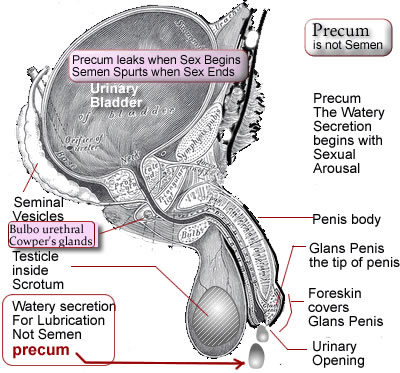What is Precum?
Precum, also known as pre-ejaculate or pre-seminal fluid, is a colorless and transparent fluid that is released from the penis during sexual arousal. It serves as a lubricant for sexual intercourse, reducing friction and enhancing pleasure.

Does Precum Contain Sperm?
The presence of sperm in precum is a topic that generates significant interest and confusion. The short answer to the question is yes, precum can contain sperm. However, the likelihood of sperm being present in precum is relatively low compared to ejaculated semen.
While precum itself does not typically contain sperm, it is possible for sperm from previous ejaculations to remain in the urethra. During sexual arousal, these residual sperm can mix with precum as it is expelled from the penis. Consequently, if precum contains sperm, there is a potential risk of pregnancy, albeit relatively low.
Several factors contribute to the presence of sperm in precum:
1. Recent Ejaculation:
The likelihood of finding sperm in precum is higher if an individual has recently ejaculated and has not yet urinated. Urination helps to flush any remaining sperm from the urethra, reducing the chances of sperm being present in subsequent precum.
2. Individual Variation:
Some individuals naturally produce precum that is either completely devoid of sperm or contains very few sperm. On the other hand, some men may release precum with larger quantities of sperm. These variations are influenced by factors such as genetics, health, and overall sperm production rate.
3. Fertility Awareness:
If pregnancy prevention is a concern, assuming that precum does contain sperm is always prudent. It is worthy to note that sperm can survive in the female reproductive system for several days, and even small amounts of sperm within precum can have the potential to fertilize an egg.
To ensure maximum protection against unintended pregnancy, using barrier methods such as condoms, or practicing abstinence, are more reliable options than relying solely on withdrawal or the absence of full ejaculation.
In Conclusion
Precum, without a doubt, does have the potential to contain sperm. While the likelihood may be lower than in ejaculated semen, it is not a risk worth ignoring, especially for couples relying on natural or non-hormonal methods of contraception. Understanding the factors that influence sperm presence in precum, combined with careful consideration of contraception options, can go a long way in preventing unintended pregnancies.
Now that you are armed with accurate information, you can make informed decisions about your sexual health. Remember, when in doubt, it is always wise to consult a healthcare professional for personalized advice.
Related FAQs about does precum have sperm
Is it possible for precum to contain sperm?
Yes, it is possible for precum to contain sperm, although the likelihood is relatively low compared to ejaculated semen.
What factors contribute to the presence of sperm in precum?
The presence of sperm in precum can be influenced by factors such as recent ejaculation, individual variation in sperm production, and fertility awareness.
Can pregnancy occur due to precum that contains sperm?
Yes, pregnancy can occur if precum contains sperm, although the risk is relatively low. Sperm can survive in the female reproductive system for several days, increasing the potential for fertilization.
Can urination eliminate sperm from the urethra before precum is released?
Yes, urination after ejaculation helps flush any remaining sperm from the urethra, reducing the chances of sperm being present in subsequent precum.
What are the most reliable methods to prevent pregnancy?
Using barrier methods such as condoms, practicing abstinence, or considering hormonal or non-hormonal contraception options are more reliable methods to prevent unintended pregnancies compared to relying solely on withdrawal or the absence of full ejaculation.
Glossary about does precum have sperm
1. Precum: Precum, also known as pre-ejaculate or pre-seminal fluid, is a colorless and transparent fluid that is released from the penis during sexual arousal. It serves as a lubricant for sexual intercourse, reducing friction and enhancing pleasure.
2. Sperm: Sperm refers to the reproductive cells produced by males that are necessary for fertilization. They are typically motile and can fertilize a female egg, leading to pregnancy.
3. Ejaculation: Ejaculation is the process wherein semen, which contains sperm, is expelled from the penis during sexual climax or orgasm.
4. Urethra: The urethra is a tube-like structure that connects the bladder to the external opening of the penis. In males, it serves as a pathway for urine and semen to exit the body.
5. Pregnancy: Pregnancy occurs when a sperm fertilizes an egg, leading to the development of an embryo and subsequent growth of a fetus within the uterus or womb of a female.
6. Genetics: Genetics is the scientific study of genes, heredity, and variation in living organisms. It involves understanding how traits are passed from parents to offspring and the role of DNA in the inheritance of traits.
7. Contraception: Contraception, also known as birth control, refers to methods or devices used to prevent pregnancy by interfering with the process of fertilization or implantation. It allows individuals to have control over their reproductive options.
8. Barrier Methods: Barrier methods of contraception, such as condoms, diaphragms, or contraceptive sponges, involve using physical barriers to prevent sperm from reaching the egg during sexual intercourse.
9. Abstinence: Abstinence refers to refraining from sexual intercourse or any sexual activity involving the exchange of bodily fluids. It is a method of contraception that completely avoids the risk of pregnancy and sexually transmitted infections.
10. Healthcare Professional: A healthcare professional, such as a doctor or nurse, is an individual who is trained and licensed to provide medical care, diagnosis, and treatment to patients. They play a crucial role in guiding individuals towards informed decisions about their health.
